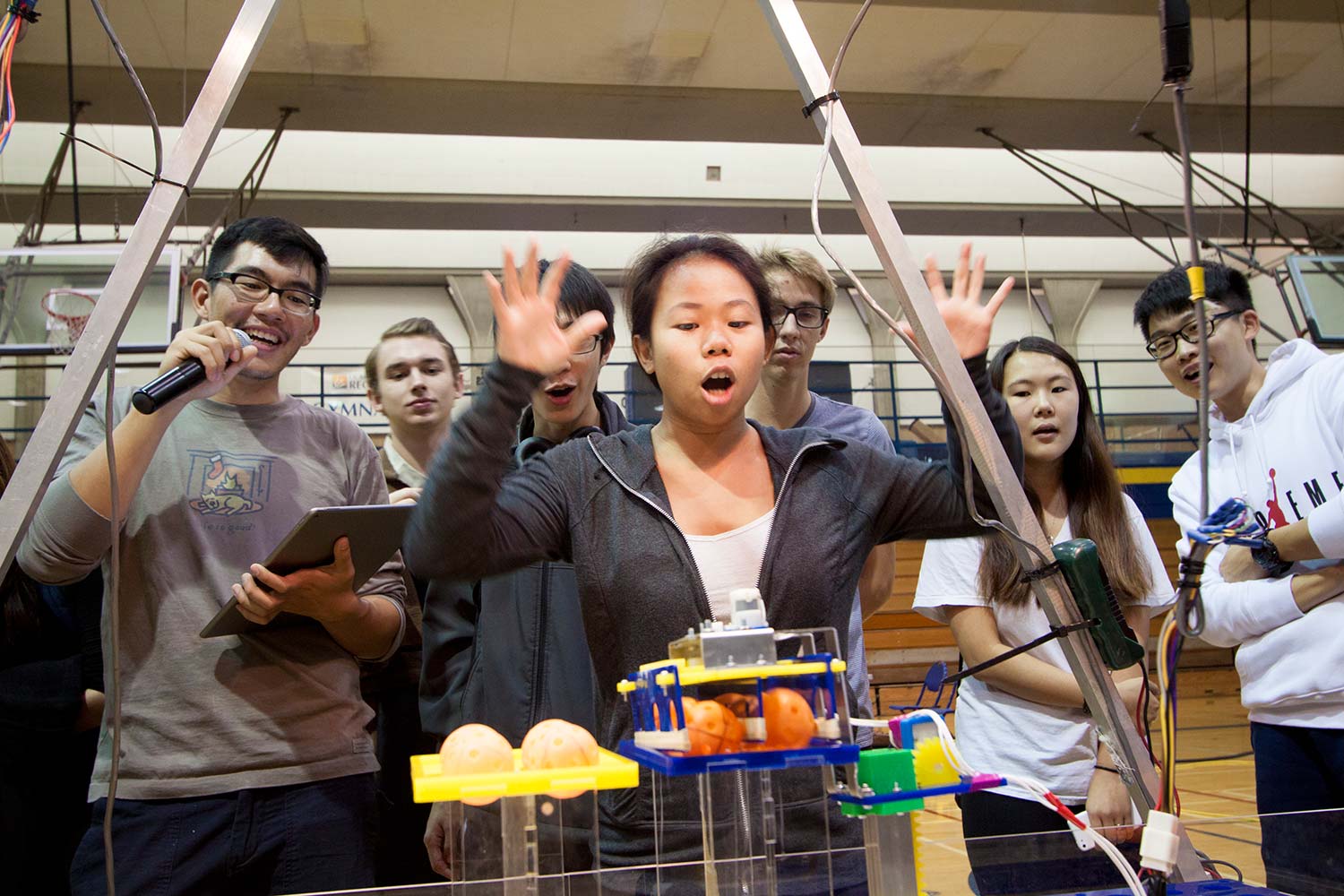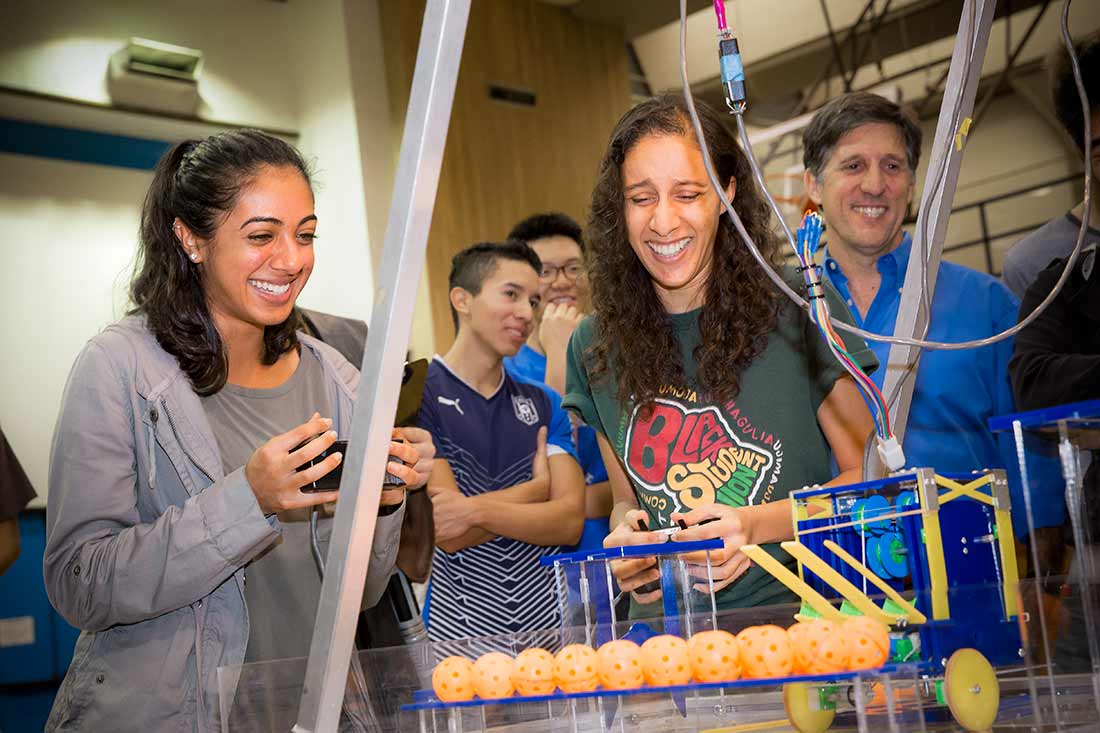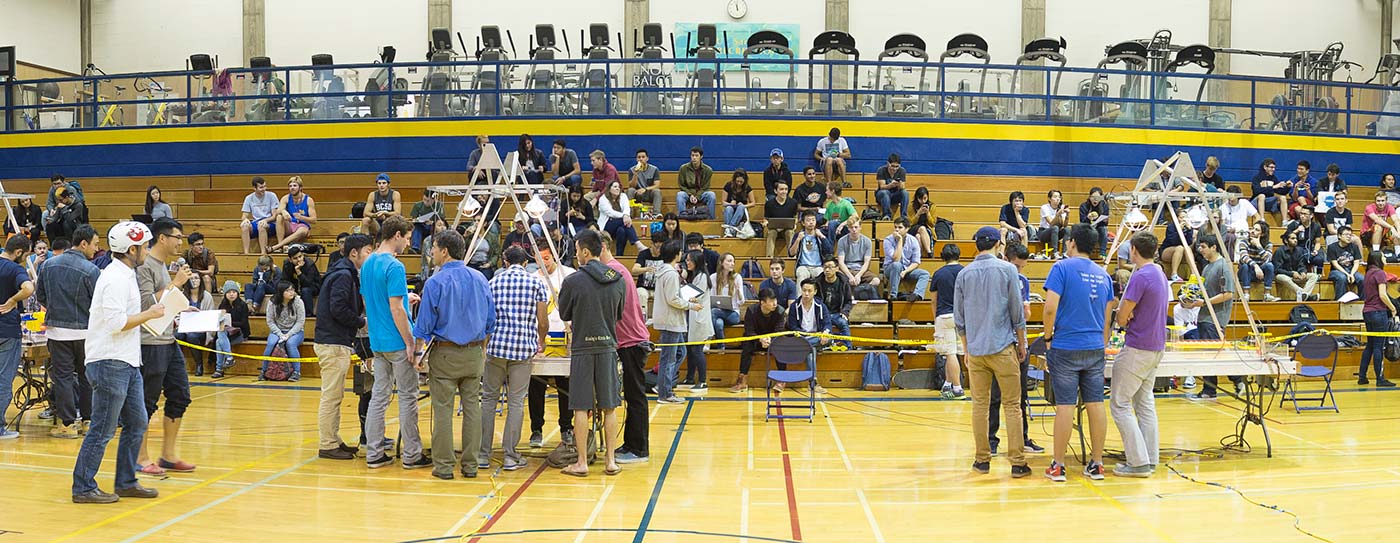By:
- Ioana Patringenaru
Published Date
By:
- Ioana Patringenaru
Share This:

The Robotic Force Awakens at UC San Diego
New Experience Engineering Initiative aimed at giving students more hands-on experience
The movie premiere was still more than a week away, but Star Wars fever was already peaking at UC San Diego Dec. 9 during the campus’ semi-annual robotics competition. This year, the event was themed after the movie—of course—with teaching assistants dressing up as Jedi Knights and professor Michael Tolley donning a Star Wars rebel helmet. A total of 45 teams and 165 students vied for the big win.

Each team was responsible for designing and building remote-controlled robots. The robots’ job was to pick up whiffle balls, representing BB-8 type droids, and drop them onto platforms of various heights, representing X-wing fighters.
The goal of the exercise is to teach students the basic principles behind the design and building process for a robot, said Tolley. The class’s other goal is to teach students problem-solving and expose them to challenges they will encounter in real-world situations, said Nathan Delson, a teaching professor who co-leads the class with Tolley.
“I want to empower students,” he said, “to allow them to go from an idea to getting something working.”
This is how engineers learn problem-solving and troubleshooting, as well as working in teams and delivering a working device by the deadline, said Delson. “You can’t learn how to make decisions under pressure without actually going through the process.”
The class, MAE 3, is part of an effort to provide more hands-on learning opportunities for all engineering students, from incoming freshmen to seniors. The Jacobs School-wide Experience Engineering Initiative involves all of the engineering departments, from structural engineering to nanoengineering. Projects in other classes in fall quarter included designing and programming robots, programming model boats for autonomous movement and designing and building miniature cars powered by hydrogen fuel cells.
Back in the Main Gym on Dec. 9, the three-hour-long Star Wars-themed competition remained lively thanks to lead teaching assistant Daniel Yang, who emceed the event. He peppered his running commentary with references to everything from the movie Pacific Rim, Drake’s hit “Hotline Bling” and other pop culture references.
In the end, the Force was strongest with the appropriately named team Star Force. The team’s students, comprised of three juniors and a freshman, wrapped up design fairly early in the quarter. They then spent three weeks practicing with their robot. They quickly figured out that it jammed when attempting to reach the platform that earned them the highest score, said driver Marissa Miramontes. So they decided not to try that manoeuver until the time was almost up for each round.
“It saved us,” said Clifford Miranda, the team’s lone freshman. Indeed, in the finals, team Star Force’s opponents, the curiously named team Z;nfslad, tried to shove the robot off the top-scoring platform. But team Star Force’s robot stayed put, taking them to victory.
Star Force had become the team to beat after scoring a perfect 72 points during a quarter final round. They then prevailed during a two-round semi-final against team Sam’s Club. The two teams tied in the first round, forcing a rematch, which ended with a Star Force victory. One of Star Force’s secret assets was junior Cathleen Nguyen. She talked the robots drivers, Miramotes, Miranda and junior Chui Shan Yu, through all the maneuvers. To spectators, she looked like a robot whisperer of sorts.

“At first, we only wanted to score one point,” Nguyen said. “But then we started to believe we could win.”
Students in other Experience Engineering classes also were enthusiastic. “I think this class is a good intro to robotics because it doesn’t require any former knowledge and gives you a feel for components and coding with other people,” said Christian Woll, a mathematics-computer science major who took part in CSE 91, dubbed the Gadgetron Robot Factory class. “I really like the small class setting.”
Rishi Prashadha, a freshman, said that making a hydrogen fuel-cell car was the best part of his chemical engineering class, CENG 4. “It was the most fun by far since we could watch the car move around, and I could really see how everything was applicable to real life,” he said.
A class teaching students how to program model boats to autonomously follow a route, MAE 198, was a good reality check about how engineering actually happens, said Delta Caraulia, a sophomore and mechanical engineering major. “I learned a lot about what you think is going to happen versus what actually happens,” she said.
Share This:
You May Also Like
Stay in the Know
Keep up with all the latest from UC San Diego. Subscribe to the newsletter today.



